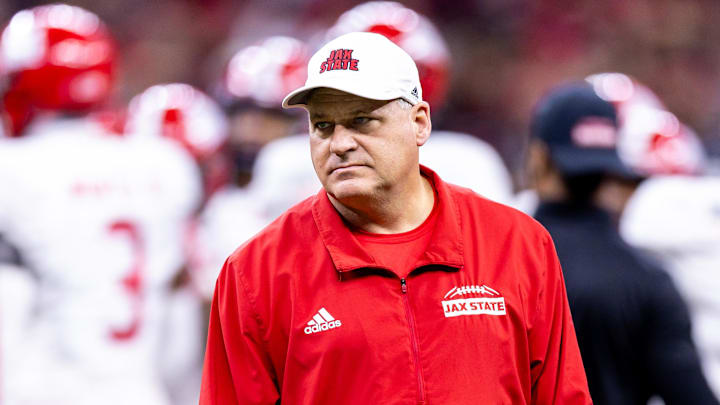The question comes up every few years: why doesn't Alabama Football schedule other programs in the state other than Auburn? Most power programs throw a bone to the smaller schools in their state, but it's been a longstanding policy that Alabama will not play in-state schools outside of the Iron Bowl. In fact, it's been 80-years since the last time Alabama played an in-state school not-named Auburn.
That was way back in 1944 when the Crimson Tide played Samford, then known as Howard College. That was also during the four-decade break the Iron Bowl took, which returned in 1948 and Alabama has been ignoring the smaller schools in the state ever since.
This subject is back in the news due to Jacksonville State head coach Rich Rodriguez's recent comments. A week ago on his weekly radio show, which is now hosted by legendary former Tide radio play-by-play announcer Eli Gold, Rodriguez said, "if they want to pay me $2 million, I'll be down there on Saturday and Sunday, I'll play them twice, get $4 million and have a great time. I'll even sing Roll Tide for them if they want."
The post didn't sit particularly well with some former Jacksonville State players, such as former offensive lineman and current CFB writer/analyst Kyron Samuels, as Rodriguez went on to state how he would happily let his players get their brains beat in.
media man hat off for a second, as a former player/alum it’s confusing to see. our history against FBS programs is strong. beat fsu, ole miss, & fiu. took auburn to OT. should’ve beaten south carolina last year.
— Kyron Samuels (@kyronsamuels) September 3, 2024
expectation would be to compete & win. from the players at least.
(Samuels is a tremendous follow on twitter. His knowledge of the game as a former player is immense, and he's great at explaining ball in more lamen terms for us non-experts.)
AL.com's Nick Kelly caught up with Alabama Athletic Director Greg Byrne, and Byrne said what he's said since the took the job: Alabama is comfortable with their current scheduling model and that won't be changing any time soon.
Of course, that's not entirely true because Byrne said the same thing in 2017 and Alabama's scheduling model has changed since then. The Tide went from scheduling neutral-site games against Power-5 competition and pivoted to home-and-home trips every year that extends through the next decade. So obviously Alabama is comfortable changing its scheduling model when it's convenient to do so.
Alabama typically schedules three buy-games ever year, a number that will be shrinking to two starting next year as they'll begin playing two Power-4 conference opponents each season. Alabama gave Western Kentucky $1.9 million to come to Tuscaloosa for the season opener. They were a bit more frugal in a 2-for-1 series with South Florida and will ultimately end up paying the Bulls $1 million in total thanks to taking the trip to Tampa last season.
Keeping that money in-state makes sense. Even if Alabama understandably refuses to help UAB, in large part due to Gene Bartow's letter to the NCAA in 1991 regarding Coach Bryant and allegations of cheating.
But there's still Troy, South Alabama, and Jacksonville State in the FBS. And then Samford, Alabama A&M and Alabama State in the FCS ranks if the Tide still chooses to schedule teams from the lower sub-division moving forward.
Obviously, the University of Alabama is under no obligation to help the other in-state schools, but isn't it the right thing to do? Wouldn't we rather support the in-state programs and help them flourish instead of sending the money outside of our borders? It feels like a microcosm of the issue the state has in general, with every state bordering Alabama allowing lottery and gambling, which prompts millions of dollars per year to escape a state that could use every penny toward the public school system.
Alabama is one of the biggest brands in college football. That was the case 18-years ago before Nick Saban arrived in Tuscaloosa, and it's even more the case after the run of dominance he had with the Crimson Tide before retiring in January. Paying money to these schools will not adversely affect the University or its standing among the elite of college football. There's no concern in creating another Auburn.
It hasn't impacted teams like Michigan or Ohio State; it hasn't hurt Georgia or Clemson, either.
I can assure you that losing to Troy or Jacksonville State would not be more embarassing than losing to UL Monroe or Northern Illinois was.
Alabama basketball has had no problem scheduling programs from the state. They've played South Alabama, they've played Troy, they've played the state's HBCU's.
It also gives a chance for the kids at these smaller programs to fullfill a life-long dream of playing at Bryant-Denny Stadium. Most of the players that end up at the South Alabama or Jack State's of the world didn't grow up dreaming of being a Jaguar or Gamecock. They grew up dreaming of playing in the crimson and white or the orange and blue.
Scheduling a game once in a while against another school from the state would allow a lot of kids to live that dream, if only for a moment. But it's a moment they would remember forever. But it's a moment that the University refuses to give them.
